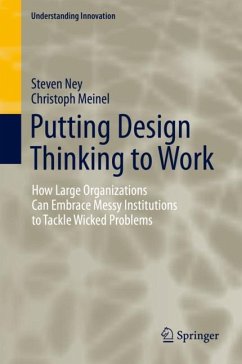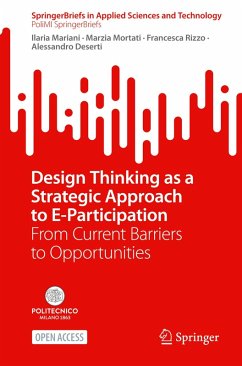
Putting Design Thinking to Work
How Large Organizations Can Embrace Messy Institutions to Tackle Wicked Problems
Versandkostenfrei!
Versandfertig in 6-10 Tagen
43,99 €
inkl. MwSt.
Weitere Ausgaben:

PAYBACK Punkte
22 °P sammeln!
This book discusses how the methods and mindsets of design thinking empower large organizations to create groundbreaking innovations. Arguing that innovations must effectively tackle so-called "wicked problems," it shows how design thinking enables managers and innovators to create the organizational spaces and practices needed for breakthrough innovations. Design thinking equips actors with the tools and methods for harnessing the creative tensions inherent in pluralist, often conflicting disciplinary approaches. This, however, requires the transformation of contemporary organizational cultur...
This book discusses how the methods and mindsets of design thinking empower large organizations to create groundbreaking innovations. Arguing that innovations must effectively tackle so-called "wicked problems," it shows how design thinking enables managers and innovators to create the organizational spaces and practices needed for breakthrough innovations. Design thinking equips actors with the tools and methods for harnessing the creative tensions inherent in pluralist, often conflicting disciplinary approaches. This, however, requires the transformation of contemporary organizational cultures away from monolithic, integrated models (or identities) toward more pluralist, dynamic and flexible institutional identities. Based on real-world cases from a wide range of organizations around the globe, the book offers managers and innovators practical guidance on initiating and managing the cultural transformations required for effective innovation.














